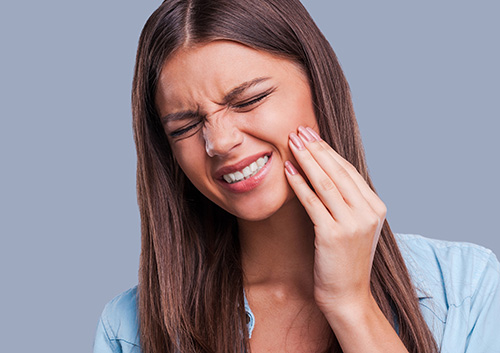September 5th, 2017

Bad breath: We’ve all dealt with it. You’ve been around people who have it and, like it or not, you have had it yourself. It can be embarrassing and uncomfortable, but how do you know if you have it? There is actually a simple test you can do to see if you have bad breath.
Wash your hands well, then put your finger in your mouth, way in the back. Scrape a little saliva from the back of your tongue, and then dab it on the back of your hand. Wait for one minute, then hold your hand to your nose and sniff. Is it fresh as a daisy? Or do you need to keep reading and learn how to freshen your breath?
How Bad Breath Starts
There are several ways that bad breath starts. Knowing the causes of bad breath is a solid start toward the cure.
- The bacteria in your mouth: Bacteria is always in your mouth. It covers your gums, hides between your teeth, and hangs out on your tongue. As it multiplies, it produces toxins that cause the foul odor in your mouth.
- Your bad habits: If you smoke cigarettes, a pipe, or cigars, or chew tobacco, you are not only harming your mouth and body, you are creating some really smelly breath.
- Your tonsils: If you still have your tonsils, they can be the cause of bad breath. They are pitted, so smelly substances can collect in the pits and lead to bad breath.
- Stomach issues: A stomach virus, ulcer, GERD, and other stomach issues could be the cause of your bad breath. A low-carb diet can put your body into a state of ketosis, which causes very bad breath.
- The foods you eat: Garlic, onion, and other pungent foods will linger with you … on your breath.
Tips for Busting Bad Breath
Achieving fresh breath isn’t difficult, but it does require a little work. Try these tips for fresher breath and a healthier mouth.
- Brush your teeth after every meal. You can also pick up a tongue scraper to use a couple of times a day to remove any lingering bacteria on your tongue.
- Floss once a day to remove food particles between your teeth as well as plaque. Your mouth will thank you.
- Gargle with special mouthwash to banish bad breath. The oxygen in it will kill the bacteria in your mouth that is causing your bad breath, and leave you fresh as a daisy!
- Drink water to avoid dry mouth, which is a common cause of bad breath.
- Ease your tummy troubles with antacids and other remedies. Ginger tea is a great tummy tamer.
- Chew gum that contains xylitol. Saliva keeps your mouth moist, and chewing gum makes you salivate. Bye bye, bad breath!
- Eat yogurt. It contains “good” bacteria that helps balance your gut and gives you a healthier mouth.
- Soothe your sinuses. Sinus infections can cause you to have bad breath. Actually, it is the post-nasal drip that causes the foul odor. Cure the infection and your breath will improve.
- Avoid all tobacco products (cigarettes, pipes, cigars, chewing tobacco, and snuff).
- Eat a healthy diet of fresh fruits and vegetables, lean meats, and whole grains.
And don't forget! Get regular dental checkups at Pioneer Dental.
August 29th, 2017

You just crunched down on a piece of hard food when you suddenly realize there is something hard still in your mouth. Your nightmare is confirmed when you retrieve a piece of your tooth from your mouth. You chipped your tooth; now what?
Obviously, the first thing you need to do is call our West Bend, WI office. While we make every effort to see emergent cases immediately, you may have to wait a day or so before you can see Dr. Carl Meyers. Luckily, it’s easy to take care of your chipped tooth while you wait.
How to Take Care of a Chipped
The last thing you want is for the tooth to become infected or break even more. Let’s look at a few things you can do:
- If the chipped tooth is causing you pain take an over-the-counter pain medication, like Tylenol. Always follow the directions on the label.
- You should also rinse your mouth with lukewarm saltwater, as this will help prevent an infection from setting in.
- If your chipped tooth has a sharp edge, cover it up with a piece of wax to prevent it from cutting you cheek, tongue, or lip.
- If you have to eat, make sure you eat soft foods and don’t bite down on the chipped or broken tooth.
Treatment Options for a Chipped Tooth
- Dental Filling and Bonding – If you only have a small chip in your tooth, Dr. Carl Meyers will probably fix it with a filling. If it is a front tooth, we may bond the tooth using a tooth-colored compound.
- Dental Crown or Cap – If you broke a large piece of your tooth, we may grind the remaining part of your tooth and put a crown or cap on it.
- Dental Veneers – If you chipped or broke your front tooth then choosing a dental veneer may be your best choice. It will make your tooth look completely normal.
- Root Canal – If you cracked your tooth and the center (pulp) of the tooth is exposed and infected, you will need a root canal. If the center of your tooth is exposed, it becomes vulnerable to bacteria that will cause your tooth to abscess.
Chipping or breaking your tooth is never a good thing, and you should always call our West Bend, WI office right away. The sooner you get your tooth repaired the less likely you are to have any problems with it.
August 22nd, 2017

While there is no definite evidence that if your prevent gum diseases, like periodontitis, that you may be able to prevent a heart condition or heart disease. The only thing experts, like Dr. Carl Meyers, know for sure is that if you take care of your gums it can lessen atherosclerosis, (build-up of artery clogging plaque) that may result in a heart attack or stroke.
Could periodontal disease cause heart attacks?
Regardless of your oral health, if you're at a high risk for heart disease, you need to take action.
- Maintain a healthy weight or lose weight.
- Consume healthy foods and beverages.
- Exercise several days the week. Walking is a powerful and lightweight exercise and will clear your head while helping your body get or stay healthy.
- Control any medical conditions you may have such as high cholesterol, diabetes, or high blood pressure.
- Reduce your stress. Have lunch with a friend, go for a walk in the park, take a bubble bath, mediate, or do whatever you find relaxing.
- Get a social life. Laughing reduces stress and “feel good” hormones. Everyone needs to feel like they are a part of something: join a book club or any activity where you can interact with other people at least once or twice a week
- Be sure to get enough sleep. The recommended amount is eight to nine hours a night. It has been proven that a lack of sleep increases your risk for angina, strokes, and heart attacks.
- Practice good oral hygiene to keep bacteria in check and your mouth healthy.
Contact our West Bend, WI office if you have questions about your heart and oral health. If you take practice good oral hygiene, both your mouth and your heart will thank you.
August 15th, 2017

The average adult has 32 teeth, a combination of molars, canines, and incisors. By middle age, however, most adults are missing at least one tooth due to an injury, decay, or gum disease. Though many people choose to forgo tooth replacement, Dr. Carl Meyers and our team at Pioneer Dental will tell you that every tooth is important. Each plays a vital role in the structure of the mouth and in relationship to the remaining teeth. Leaving the space where a tooth once stood can have serious consequences. There are many reasons why severely decayed or missing teeth should be replaced as quickly as possible.
- Speech: A missing tooth can negatively affect the way you speak, depending on its location.
- Bite changes: The loss of one or more teeth can cause the redistribution of bite pressure onto other teeth. Over time, this can cause the teeth to shift and move into the space the tooth once held.
- Gum disease: Shifting teeth can make it easier for plaque to accumulate in hard-to-reach places. This can increase the risk of gum disease, which can lead to additional tooth loss.
- Bone loss: The teeth are place-holders in the jaw. When one falls out and is not replaced, the bone that once surrounded it begins to deteriorate and wear down.
- Aesthetics: A missing tooth leaves a visible gap between the teeth and can be a source of embarrassment and insecurity.
Advancements in modern dentistry have made it easy to replace missing teeth using natural-looking and functioning prosthetics. Dental implants are permanent solutions for replacing missing teeth with the use of special rods that are anchored in the jaw bone. These implants serve as artificial tooth roots that fuse with the jaw over time. When cared for properly, most dental implants can be fitted to last a lifetime.
To learn more about dental implants, or to schedule an appointment with Dr. Carl Meyers, please give us a call at our convenient West Bend, WI office!







